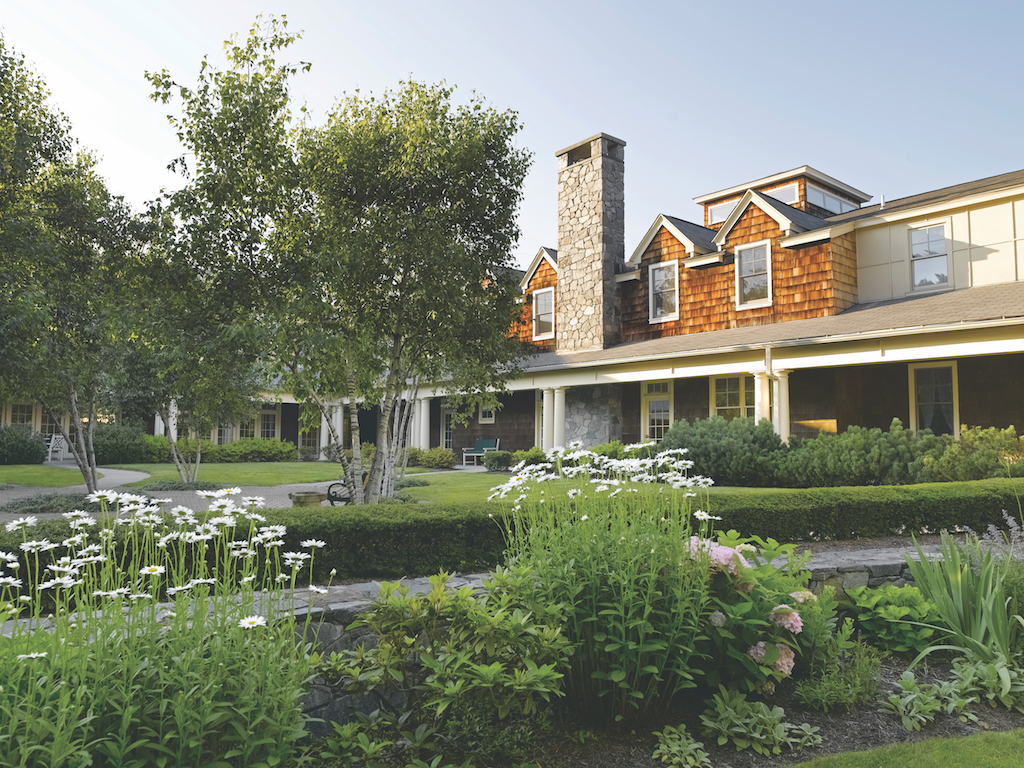Assisted living facilities and nursing homes can be a good solution to problems that may arise for seniors: they supervise their healthcare to varying degrees, provide a ready source of peers and more. If you’re thinking of an assisted living facility or nursing home for yourself or someone you love, though, there are many things to keep in mind—from what’s offered to what questions to ask to whether it’s the right fit in the first place.
Most seniors prefer to remain in their homes, which could be possible with the proper care and safety features in place, says Allison Ostroff, MD, the director of the division of geriatrics at Stamford Health. But, she adds, not all older adults feel that way: “For many seniors, however, they may desire a different option—one in which there is more socialization, things are handled for you, such as meal preparation, cleaning and even things like management of medications. For people who are looking for a change, I would recommend an assisted living facility (ALF),” Dr. Ostroff says. “ALF’s have various levels of care—from independent, where you receive all your meals and the benefit of innumerable activities throughout the day as well as new friends, to assisted, all the way to memory care [for those with dementia].” Nursing homes, on the other hand, are usually reserved for those with more complex medical needs or who don’t have the resources for an assisted living facility, she says.
As you navigate this new situation, here are some tips to keep in mind:
Start looking before you think you should.
“Our experience shows that people who are considering a senior living community are best served when they do their research and make a choice well before they need it,” says Matthew G. Anderson, President and CEO of The Osborn in Rye, NY, a continuum of care community with independent and assisted living, as well as a Memory Care Center and other resources. “Once a health issue arises, the range of options may be limited, depending on a variety of factors. The best time to choose a facility is before you actually need one.”
Consider the type of care offered—and how it changes over time.
As you research places, be sure to evaluate what you or your loved one might need today and also in the future. “The right assisted living community should be able to provide a variety of levels of service to meet a resident’s needs as they grow and change,” explains Janis Knorr, the executive director of Atria Darien in Darien, CT. “For example, when your mom moves in, she may be able to bathe and get dressed on her own; then, a few years later, she may need someone to stand by and ensure that she doesn’t fall or need a little help putting her clothes on for the day.”
And not all assisted living facilities will offer the same type of care, says Richard Russo, CSA of CarePatrol, a nationwide senior placement service with offices in Connecticut, Westchester and Manhattan that helps guide families through the process of choosing an assisted living facility, dementia living facility, or nursing home. “Some are what we call a ‘social model’ and others are what we call a ‘medical model,’” he says—with the medical model offering more in the way of healthcare needs, like oxygen or feeding, and the social model a better fit for “higher physically-functioning seniors.”
Take the tour.
As you look into your options, schedule a tour of each facility to get a sense of what it’s really like, down to the details. “There is no substitute for a facility visit when you can tour the different levels of care, meet residents to gauge their happiness, and ask questions of staff members,” explains Anderson. As you look around, be realistic about what appeals to you, or would appeal to your loved one if they’ll be the one entering the facility. “If the decision is not medically driven, then consider a community that matches the taste and lifestyle of the individual,” recommends Russell R. Barksdale, Jr., President and CEO at Waveny LifeCare Network, based in New Canaan, CT. “Consider what their likes and dislikes are—and don’t get caught up in the new chandeliers and heated pools when Mom’s house is homey and she never liked swimming.”
Talk to a variety of people.
“During each visit, [families] should speak with key leadership, including the executive director, activities director and healthcare and nursing management, to get an idea of their care and service approaches and philosophies,” Knorr says. There are six areas she recommends asking about and evaluating: surroundings (are the grounds, landscaping and building exterior well-maintained?); dining (were you invited to dine with residents?); residents (were they gathered throughout common areas and engaged in solo or group activities?); staff (what is their average length of tenure?); community amenities (what’s offered?); and costs and financials (are there recurring monthly fees?). Another smart idea is to tour at different points in the day, as well as both on the weekends and on weekdays, says Dr. Ostroff.
Distance is also a key consideration.
“If you plan to visit your loved one often [or, if you will be the resident, you are hoping your loved ones will visit you frequently], proximity of the home you select will become very important as it will become a routine commute,” says Lorraine Horgan, Vice President of External Affairs at Cabrini of Westchester, a nursing home in Dobbs Ferry, NY. For those looking for a nursing home, she also recommends the “Nursing Home Compare” tool, which can be found at medicare.gov. It lets you evaluate facilities side by side and see their ratings for things like staffing levels and health inspections.
Take all costs in account.
“Most assisted living [facilities] are private pay,” explains Russo. And just as Knorr recommends asking about monthly fees, Anderson also advises finding out what’s included in those costs and what’s not. “You don’t want to be surprised later on. Be sure to fully understand the pricing structure and all the financial aspects of moving to a facility. These vary by facility and understanding them is key to a successful transition,” he says.
And take into account how your or your loved one’s finances may change over time. “The normal financial pre-approval for assisted living is two years’ worth of assets in order to be able to afford and be approved for admissions. What happens when these resources have depleted?” says Barksdale. At Waveny, for instance, there are charity care policies with funds from endowments and investments that can help fill in the gaps. “There have never been more choices and more opportunities for a rich and rewarding lifestyle,” says Anderson. “Successful decision-making comes from thoughtful and honest communications with family members, along with input from your medical care team.
“THere is no substitute for a facility visit when you can tour the different levels of care, meet residents to gauge their happiness, and ask questions to staff members”
– MATTHEW G. ANDERSON




